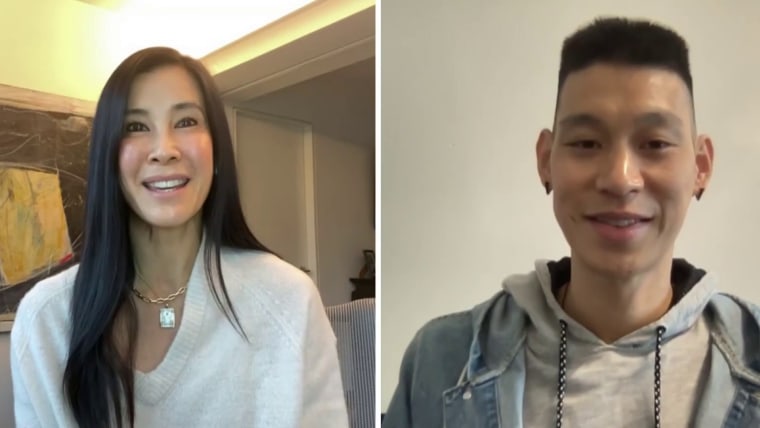Even after announcing this week that he’d let go of his dreams of returning to the NBA, trading them in for an uncertain future, basketball star Jeremy Lin says he still remains “hopeful.” He also closed this chapter of his life with some profound lessons, particularly for Asian Americans.
Lin, who passed the torch to the next generation of Asian American ballers in a raw, emotional social media post on Wednesday, told NBC Asian America that at this crossroads in his career, he’s “trying to figure out what’s next.” But the past few months of playing in the G league, in the hopes of securing a 10-day NBA contract, has further confirmed a feeling he’s long had about being an Asian American player in a field so lacking in representation — that Asian Americans need to fiercely root for themselves.
If they don’t build themselves up, Lin said, it’s rare anyone else will.
“What I would really love to see conveyed to the next generation is this belief of confidence, and having a deep confidence and security in who you are, and not being ashamed of that,” Lin said. “That is not something that will come naturally, because society is not going to instill that.”
Lin, 32, a point guard who made history as the first American-born player of Taiwanese descent in the NBA, spent the 2020 season playing overseas in China for the Beijing Ducks. Averaging an impressive 22.3 points a game, Lin helped lead the team to the semifinals. Still, he held onto hopes of reviving his NBA career and returned to the U.S. this year, signing with the Golden State Warriors’ G-league affiliate, the Santa Cruz Warriors — which he called “a move few vets dare make.”
Despite achieving some career highs and being the seventh-leading scorer in the league, averaging 19.8 points a game, Lin said he was not given the same opportunities as his peers, and as the season progressed, he watched his shot at being called up to the NBA dissipate.
“What I would really love to see conveyed to the next generation is this belief of confidence, and having a deep confidence and security in who you are, and not being ashamed of that,” Lin said. “That is not something that will come naturally, because society is not going to instill that.”
His “chance never materialized,” he wrote. Race, he believes, likely factored into it. And though he was not short of the empirical evidence needed to prove he was a well-rounded player, his circumstances made him feel otherwise, prompting a crushing sense of self-doubt.
“I’ve always had a target on my back, just because of what I looked like. … People were so quick to minimize anything and everything I’ve done. There are times where I would clearly accomplish something amazing. There would be very minimal type of recognition after,” he said. “I would start to minimize my own accomplishments, because I felt like nobody else really understood or cared, and so it even affected the way that I viewed myself.”
He added: “As the time kept going, I was thinking to myself, ‘Hey, maybe you didn’t prove yourself that much, or you’re not that good. Or maybe you don’t really deserve it. And that’s something that I had to wrestle with a lot.”
Now, looking back at his run, he questions whether those who evaluate talent in the NBA are giving Asian American athletes the even shot they deserve. Too often, they’re defined by their failures, rather than assessed by their total game, Lin said.
In his case, his meteoric rise with the New York Knicks in his second year as a pro, and the “Linsanity” phenomenon that followed, was often weaponized against him, framed as a fluke, he said. Many failed to look at the remainder of his nine seasons in the NBA, but simultaneously amplified his inconsistent play with Toronto in 2019, despite helping the Raptors win the championship, he said.
For Asian Americans, Lin underscored, the league presents “such an uphill battle.”
“If you play well, and you do it once, as an Asian, that’s not good enough. You have to do it two times, three times, four times, five times to really start to chip away at some of the some of the stereotypes,” Lin said. “I had 10 bad games in Toronto and watching how quickly it basically evaporated my entire NBA opportunity — for the last two years I’ve been trying to get back in. And then I play in the G League and I’m still unable to get even a look. I think that is what the next generation will have to deal with.”
“I never had a player take me under their wing in the NBA, no one ever thought I was going to make it. Even when I was in the NBA when I was young, no player was ever like, ‘Look, man, I see a lot of potential in you, I’m going to teach you everything I know,’” Lin said. “That’s never happened.”
And while many young players found mentors and leaders in the industry who wanted to prepare them for the daunting journey ahead, Lin said he was given no such guidance.
“I never had a player take me under their wing in the NBA, no one ever thought I was going to make it. Even when I was in the NBA when I was young, no player was ever like, ‘Look, man, I see a lot of potential in you, I’m going to teach you everything I know,’” Lin said. “That’s never happened.”
Because of how racialized his performance was perceived early on in his NBA career, Lin, whose parents were Taiwanese immigrants, hadn’t always been so vocal about the issues he’s confronted because of his heritage. But for Lin, like most Asian Americans, his connection to his identity has been in constant evolution, molded by memories of joy, yet carved by painful ones, and taking different shapes depending on the racial makeup of the environment. His time in China added a layer of confusion as well, but he says it all came to a head during the pandemic.
Lin — who will also appear in Friday’s “See Us Unite for Change” special on MTV, which will examine the history and contributions of Asian Americans amid ongoing Covid-19-related racism — said he himself got a taste of the anger and blame directed toward Asian Americans early on in the pandemic, just before the Chinese basketball season resumed. Lin watched from Beijing as the virus spread across the U.S. alongside the racism toward Asian Americans.
“There was just a freshness of it, having just spent two and a half months in the U.S., and seeing what was happening, seeing what people were saying, seeing what the previous administration was saying,” he said. “Even for me, seeing the way that I was being looked at when I would go to the grocery stores and people would look at me up and down or give me dirty looks or things like that. I felt that and so when I went over to finish my season, it was very fresh in terms of speaking out.”
The heightened activism, born from the jarring anti-Asian attacks, thrust Lin even closer to his Asian American identity, something he had run from years ago. And though his early years were defined by an ever-lingering feeling that, perhaps, he would never fit in, the voices declaring their stake in America and its history cemented, for him, that he did in fact belong here. It’s why the profound power of representation can’t be undervalued, he said.
“Growing up here, especially playing basketball, I never really felt like other people treated me as American. … It was always like, ‘Oh, look he’s a guy who plays basketball. But check it out. He’s Asian,’” Lin recalls. “Just seeing everybody speak out, and whether it’s from all these different Asian American influencers, celebrities, actors, musicians, has given me a deeper sense and appreciation of what it means to be Asian American.”
For Lin, a player so beloved by and of critical importance to the Asian American community, arriving at this conclusion has been an arduous journey, and others are likely wrestling with parallel issues of self-doubt and unworthiness. To succeed, it’s about tuning it all out.
“Whatever occupation or whatever goal or dream that they’re going for, it has to come from a deep, deep confidence,” he said. “There’s always this questioning … ‘Is she really capable of this or sustaining that?’ Those questions are going to constantly be hammered at you so really, it’s almost like noise cancellation. You can’t even hear the outside noise. You just have to keep reminding yourself, ‘I put in this work. Hey, this is what I do. Hey, I’m built for this.’”
Source: | This article originally belongs to Nbcnews.com










